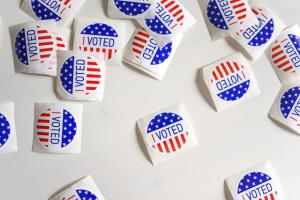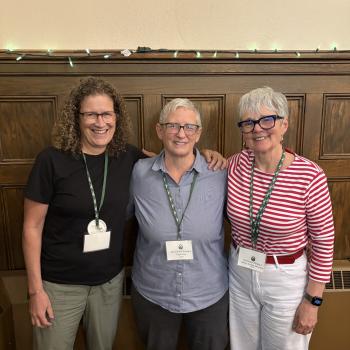Early in my career as a Christian university professor, I was bemoaning the dearth of women serving as leaders of our institutions, arguing specifically that it was time the United States elect a woman as president; and that the 200-year history of not electing women to office reflected our country’s persistent misogyny, a shared sense that women were somehow not capable of being leaders.
A colleague insisted women shouldn’t seek government roles, at least not nationally. While I’m sure his complementarian theology led to this conclusion, my colleague insisted that a woman’s primary care for her family meant she wouldn’t want to subject her children to the scrutiny of a national campaign, or to time spent away from them. Besides, he said, because local offices were better suited for women’s gifts, women served in those roles at a much higher rate than they had for higher offices.
So many assumptions. So much untruth.

Last week’s Democratic National Convention highlighted strong women in leadership on the convention’s main stage. The DNC ended its week with an inspiring speech from Vice President Kamala Harris, who has come closer than any woman in our country’s history to the presidency.
What I found more notable, though, was how these women foregrounded their families, seeing them as an asset to their campaigns and to their work. When Hilary Clinton ran for president in 2016, she downplayed her role as mother and grandmother, well aware that misogyny would weaponize her personal life against her (which happened, in spades). Clinton focused instead on her professional attempt to break a glass ceiling, one that ultimately remained intact, if weakened by her efforts.
At this year’s DNC, though, both women and men had the opportunity to talk about their families, including Governor Tim Walz, Harris’ running mate, whose joy in his family–and their love for him–launched a thousand memes (and a few unsavory trolls). A changed zeitgeist suggests that having a personal life does not prohibit men from being strong leaders, and it shouldn’t prohibit women, either.
Misogyny can be a hard habit to break, at the national and local level.
My colleague was wrong, about the gifts women needed to serve, and about their roles in local politics. There are not more women serving locally. According to the Center for Women and Politics, by 2024, women held only 32 percent of municipal offices, a percentage similar to that of women serving as state governors, and in the US legislature.
Of course, some states do better than others, including my home state of Oregon, where 43 percent of municipal offices are held by women. This number accounts for some of the talented women governing in my home community, even as only one woman (out of 46) has served as mayor in the last 130 years.
When they do serve in municipalities, women can continue to face the misogyny that has been a barrier to their serving at all. In my home community, a gifted woman elected to the city council received death threats targeting her and her family in 2022 after a local blogger recorded a conversation he had with the council person, then broadcast the audio recording, attempting to prove her association with progressives in the area. She did not let the death threats keep her from leading, and is up for re-election this fall.
Women in Municipal Leadership is Part of God’s Will
Some folks–like my colleague, two decades ago–will argue that women are not well suited for politics, at the national level. They will insist that women are meant to serve their families, and that their gifts are better suited for local elections. If this truly is the case, though, we might ask why only 32 percent of municipal offices are held by women, or why a town like mine has had only one woman serve as mayor since its incorporation in 1889.
As a person of faith who believes ardently that gender equity is God’s will, I’m encouraged that a national convention is celebrating the powerful roles women can play as leaders, especially when those in power make space for the powerless.
On Women’s Equality Day (August 26), I want to advocate for parity in local elections as well, and plan to renew efforts to get strong, equity-minded women elected in my hometown–including the woman whose life was threatened several years ago for daring to speak her mind. She nevertheless persisted, because she–like so many others–feels called to lead, helping (in the words of Kamala Harris) to “write the next great chapter in the most extraordinary story ever told” about our community, and about our country.













